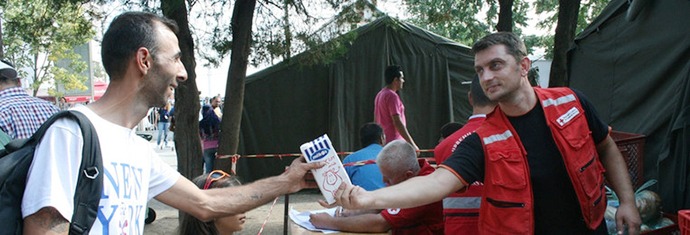
American Red Cross
Since 2011, the situation in Syria has escalated from a series of peaceful demonstrations to civil war. Nationwide protests against President Bashar Al-Assad were met with violent crackdowns at the hands of the government and the Syrian army. In January 2015, the death toll surpassed 220,000 and has since been estimated to be as high as 310,000. As Syria has plunged further into violence, the country’s infrastructure has been left in ruins. More than 11 million Syrian refugees have fled their homes to find safety abroad. What began as an isolated conflict in one country is now a crisis that requires the world to come together to give displaced Syrians a new beginning.
The majority of Syrian refugees have landed in Greece after making a treacherous journey across the Mediterranean Sea. Most travel with minimal supplies and thousands have died this year while attempting this dangerous trek. Those who do survive the crossing continue their journey by land in hopes of reaching a safer spot in Europe. The rapid increase in displaced populations has overwhelmed emergency assistance capacity in Europe. Many displaced Syrians have been left without access to food, shelter and sanitation. In some facilities in Greece, for example, the number of refugees waiting to register exceeds daily processing capacity by almost five times.
Following the recent attacks in Paris, 31 U.S. governors have taken steps to prevent Syrian refugees from being allowed into their state. Legally, governors have little power to enforce a ban on refugees because decisions on refugee status belongs to the federal government. The actions of state leaders, however, still have a political impact. Washington State governor Jay Inslee is one of a handful of governors who have gone out of their way to say refugees will be accepted, warning fellow governors not to act out of “fear.”
The American Red Cross serving the Northwest Region is under the umbrella of the national organization headquartered in Washington, D.C. and is a new Global Washington member. In addition to diverse lines of service — responding to disasters large and small, training people in life-saving skills, collecting lifesaving blood and blood products and providing services to members of the armed forces and their families — it plays a part in the national and international effort to provide refugees with life-saving relief services. To date, the American Red Cross has contributed more than $2.5 million to help displaced individuals fleeing violence in the Middle East. The organization has also donated 10,000 cots to the German Red Cross and sent five disaster delegates to help with mapping and information management. These delegates are working to collect information on which borders refugees are passing through, what supplies they need, and how to improve communications.
In addition to providing life-saving aid, the American Red Cross Northwest Region is very active in the Restoring Family Links Program (RFL). Abroad, RFL teams have been organized throughout the region where refugees are traveling. These teams offer displaced persons the opportunity to make phone calls to their relatives. Other services provided to displaced persons looking to contact loved-ones include providing satellite phones, WiFi access, mobile phone cards and phone charging cards. Mobile and internet technology will be a huge part of relief efforts going forward. “Trace the Face,” for example, is an online resource that has been launched to help reconnect refugees with their friends and family. The website provides a list of photos of inquirers from around the world who are looking for their relatives. As Washington state welcomes refugees, our American Red Cross serving the Northwest Region is preparing for an expected influx of migrants into the area. Preparations include recruiting Arabic speakers to provide translation services and developing partnerships with local organizations such as Muslim Housing Services and Refugee Women’s Alliance.
The Syrian refugee crisis is one of the worst humanitarian catastrophes in history. Displaced Syrians are going to rely on foreign aid and relief organizations for almost everything from food to connecting with their loved ones. No one country or aid organization is going to be able to address this problem alone, which is why the work of groups such as the American Red Cross is so crucial. While Syrians have had their lives uprooted, there are many, and hopefully there will be many more, ready to help them start anew.